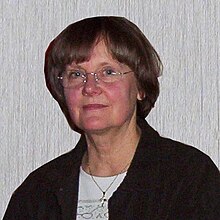| Inge Brück | |
|---|---|
 Brück in 2004 Brück in 2004 | |
| Background information | |
| Born | (1936-10-12) 12 October 1936 (age 88) |
| Origin | Mannheim, Germany |
| Genres | Pop |
| Occupation | Singer |
Inge Brück (born 12 October 1936) is a German singer and actress, best known internationally for her participation in the Eurovision Song Contest 1967.
Brück began her singing career with the Erwin Lehn Dance Orchestra, where she was noticed by pianist Horst Jankowski, who arranged a television appearance with Hans-Joachim Kulenkampff, following which she was offered a recording contract. In 1957, she had a hit with "Peter, komm heut' abend zum Hafen", a version of "Green Door", which reached No. 7 in the German chart. In the late 1950s and early 1960s, she made numerous TV appearances, appeared in stage musicals and toured with orchestras including those of Jankowski and Hazy Osterwald.
Following a 1966 victory in an International Song Festival in Brazil, Brück was selected by broadcaster NDR to be the German representative in the 1967 Eurovision Song Contest. The chosen song "Anouschka" was internally selected by the channel. Brück went forward to the 12th Eurovision, held on 8 April in Vienna, where "Anouschka" finished in joint eight place of the 17 entries.
Following her Eurovision appearance, Brück decided to concentrate on acting, and in 1970 she starred in a 13-part series for ZDF called Miss Molly Mill [de] in which she played the title role, a cleaning lady/amateur detective, which was a ratings hit and regularly drew audiences of over 20 million. Since the 1970s, Brück has concentrated on performing songs with religious content. Along with fellow Eurovision veterans Katja Ebstein and Peter Horton, she is a member of the initiative Künstler für Christus (Artists For Christ).
References
- ^ Inge Brück at IMDb
- "Anouschka" at Diggiloo.net
- "ESC History 1967". Archived from the original on 14 March 2016. Retrieved 26 November 2009.
| Preceded byMargot Eskens with Die Zeiger der Uhr |
Germany in the Eurovision Song Contest 1967 |
Succeeded byWenche Myhre with Ein Hoch der Liebe |
| Germany in the Eurovision Song Contest | |
|---|---|
| Participation |
|
| Artists |
|
| Songs |
|
| Note: Entries scored out signify where Germany did not compete. Italics indicate an entry in a future contest. | |
| Eurovision Song Contest 1967 | |
|---|---|
| Countries |
|
| Artists | |
| Songs |
|